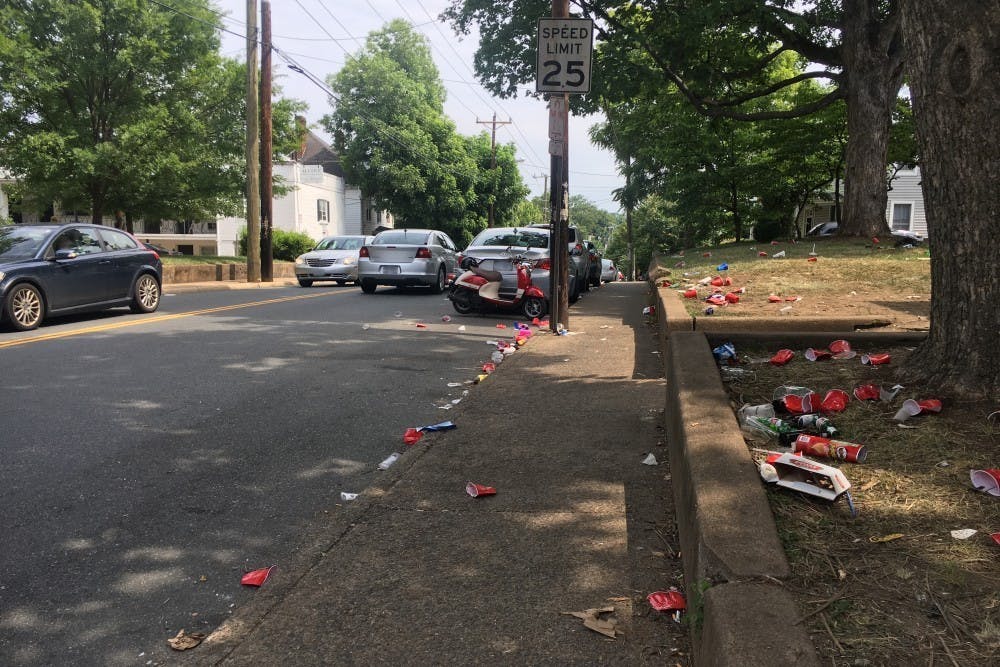Lea en español
A list of demands written by U.Va. Survivors in collaboration with Mason for Survivors at George Mason University and Culture of Respect Educators — all groups dedicated to sexual assault prevention — is quickly gaining traction after a series of sexual assault allegations posted by an anonymous Twitter account brought heightened scrutiny to sexual violence on Grounds.
While the list of demands was originally submitted in April, it gained attention recently after a Twitter account began tweeting allegations of sexual assault, harassment and misconduct sent to them by sexual assault survivors. With the promise of anonymity, survivors from the University submitted the names of their alleged abusers — including other students, faculty and student-athletes — and shared their stories. After receiving threats the original account was deleted, but other accounts have arisen to continue giving a voice to these survivors.
Addressed to University administration, Title IX and the Office of Equal Opportunity and Civil Rights, the organizations’ list of demands calls for “immediate, structural, and transformative change of the University of Virginia’s policies and resource allocation for sexual violence, sexual harassment, and intimate-partner violence prevention and support services.”
The demands center around University accountability, education and training and survivor resources. Accountability involves the University committing itself to stopping sexual violence on Grounds, addressing its past history of sexual violence and conducting an external review of the Title IX Office.
The petition also demands comprehensive and mandatory survivor-created education as well as the training of student leaders to handle situations of misconduct. It also urges the University to increase mental health resources and health services for survivors, as well as make procedural changes to the Title IX investigation process.
According to Wes Hester, the University’s director of media relations and deputy spokesperson, the University is aware of the Twitter posts and takes seriously any allegations of sexual misconduct or harassment.
“This process is confidential to protect the privacy of students, faculty, and staff members, and therefore we cannot comment on any allegations or Title IX matters,” Hester said in an email to The Cavalier Daily.
While individual cases cannot be named, the University publishes disaggregated data on Title IX issues in an annual report with information about the types of resolutions, outcomes, and range of sanctions.
According to University policy, “the University encourages anyone who experiences or becomes aware of an incident of Prohibited Conduct involving a student to immediately report the incident to the University.” Complaints can be reported to the University’s Title IX Coordinator or through Just Report It, the University’s website for online reporting, which allows survivors to remain anonymous.
The University’s Office for Equal Opportunity and Civil Rights is currently in the process of evaluating and gathering feedback from the University community on the new Title IX regulations released by the U.S. Department of Education in early May. This process will determine what changes need to be made to the University’s current policies in order to comply with the new requirements, which become effective Aug. 14.
“U.Va. will prioritize the safety and well-being of all members of the University community and continue to ensure that we have a process to address reports of sexual and gender-based harassment and violence that is empathetic, fair, and equitable,” Hester said.
Some of those who have gone through the University’s Title IX investigation process have found it to be an arduous, long and flawed procedure that fails to achieve justice for survivors. After waiting for two years, one survivor finally received the verdict that her abuser was found guilty of sexual assault, but he was still able to receive his degree and walk free with no consequences. Another survivor, when Title IX favored her abuser’s testimony over hers, reported evidence of his Honor offenses committed during the investigation to the Honor Committee, only for them to close her case due to the implications of Title IX issues in her report.
Among U.Va. Survivors’ demands is a detailed list of procedural demands for Title IX. These mainly involve timely and increased communication with complainants, increased clarity about procedures and changes in the handling of evidence. Investigators should be trauma-informed, have a system of accountability and increase in number based on the proportion of students filing reports, the document says. The demands also call for detailed explanations of the procedures both during and after investigations, as well as a written letter of apology from the respondent to the complainant should they be found guilty.
“Many of these problems, according to Title IX policy, are not permitted,” the document reads. “Nonetheless, these careless behaviors by certain investigators and Title IX staff fell through the cracks without any accountability or revision. There needs to be a system to prevent these acts from happening in the future and to ensure that the safety and dignity of complainants are not being compromised.”
Six days after the list of demands was initially submitted in April, the Office of Equal Opportunity and Civil Rights and the Division for Diversity, Equity and Inclusion responded by thanking U.Va. Survivors for their recommendations and agreeing that sexual violence is an issue that “remains a priority.” Instead of immediately taking any action, they welcomed further conversation to “share actions the University has already taken and those we may be able to take in the future.”
On June 15, the petition had 160 signatures. As of Friday, the list of demands has now garnered over 1,700 signatures from both past and current students who stand in solidarity with the demands presented.
Gabby Ringer, president of CORE and a rising fourth-year College student, believes that the list of demands is finally getting the attention it deserves. Even after all of the blowback in response to the 2014 Rolling Stone article that falsely alleged a University student was gang raped at a fraternity party, the University’s response was of the bare minimum, she said.
“I think that these demands are the culmination of sexual assault being ignored by the administration of the University for far too long and survivors and allies being fed up,” Ringer said. “Student self-governance-led iniatives in sexual assault prevention cannot be the end all be all of the University's response to the extremely pervasive issue of sexual assault on college campuses and in every day life.”
While grateful for the increased attention their petition is getting, U.Va. Survivors is also aware of the dangers of sharing these stories on social media.
“Sexual violence and interpersonal violence is really a systemic, cultural issue that needs to be addressed at its core,” said one member of U.Va. Survivors, who asked to remain anonymous. “While it may feel empowering to say a name, that just comes with a lot of risk, especially for folks that are going through Title IX cases or other legal avenues. Oftentimes revealing explicit details in these cases can put you in a lot of danger. You can get in trouble with the University, with Title IX, you can get in trouble with their lawyers for defamation.”
According to the member, the voices that are most often amplified are those of cis, straight, wealthy, able-bodied, white women. While their experiences should be believed and heard, they also noted that the voices of those who are most marginalized should be centered because they face the highest rates of violence, and it is “only when acting through the lens of intersectionality” that “a community of survivors that is truly inclusive” can be created.
The member of U.Va. Survivors criticized the @ExposedUVA Twitter account for possibly being biased, noting that despite allegedly receiving hundreds of DMs, only some stories have been posted. They said that they believe the account owner has no right to choose which stories deserve light and which don’t, as if they are compartmentalizing people’s experiences and putting a value to them.
“Our trauma doesn't have a value number, and it's also not entertainment for other people to watch,” they said. “Our experiences are real, and we deal with them every day. While this may be one moment, it's only one moment of our lives … Survivors have to be reminded that we believe you, we see you, we hear you, and we know that this one moment doesn't define your life.”
The @ExposedUVA Twitter account wrote in a Twitter post June 16 that “[u]nless I get suspended, you guys have my word that I will get around to each and every person.”
Student Council’s Prevention and Survivor Support Ad-Hoc Committee that was formed in April has been working together with U.Va. Survivors, CORE and Take Back The Night to discuss and elaborate on the most important parts of the list of demands. According to the member, it’s important for the University to have pressure from Student Council, and they hope now that their demands will shape many of the recommendations the committee is making to the University.
U.Va. Survivors is planning to have another meeting with administration over the summer. After the list of demands gained so many signatures, they have not yet sent it again to administration. Organizers for sexual assault advocacy are currently coming up with a plan for the next steps moving forward.
“We deserve support resources and to be heard,” the member of U.Va. Survivors said. “We honestly shouldn't have to go through a Twitter page. We shouldn’t have to only stick to whisper networks. The Twitter page exists because our justice system has failed us.”







